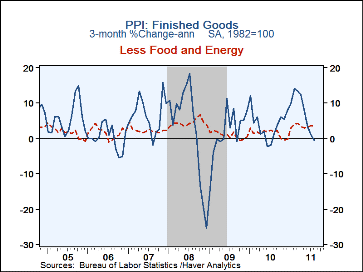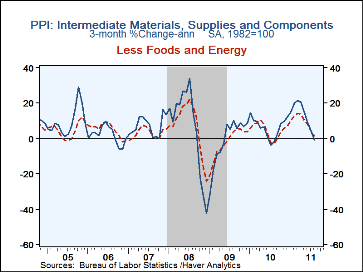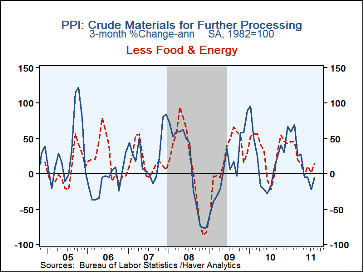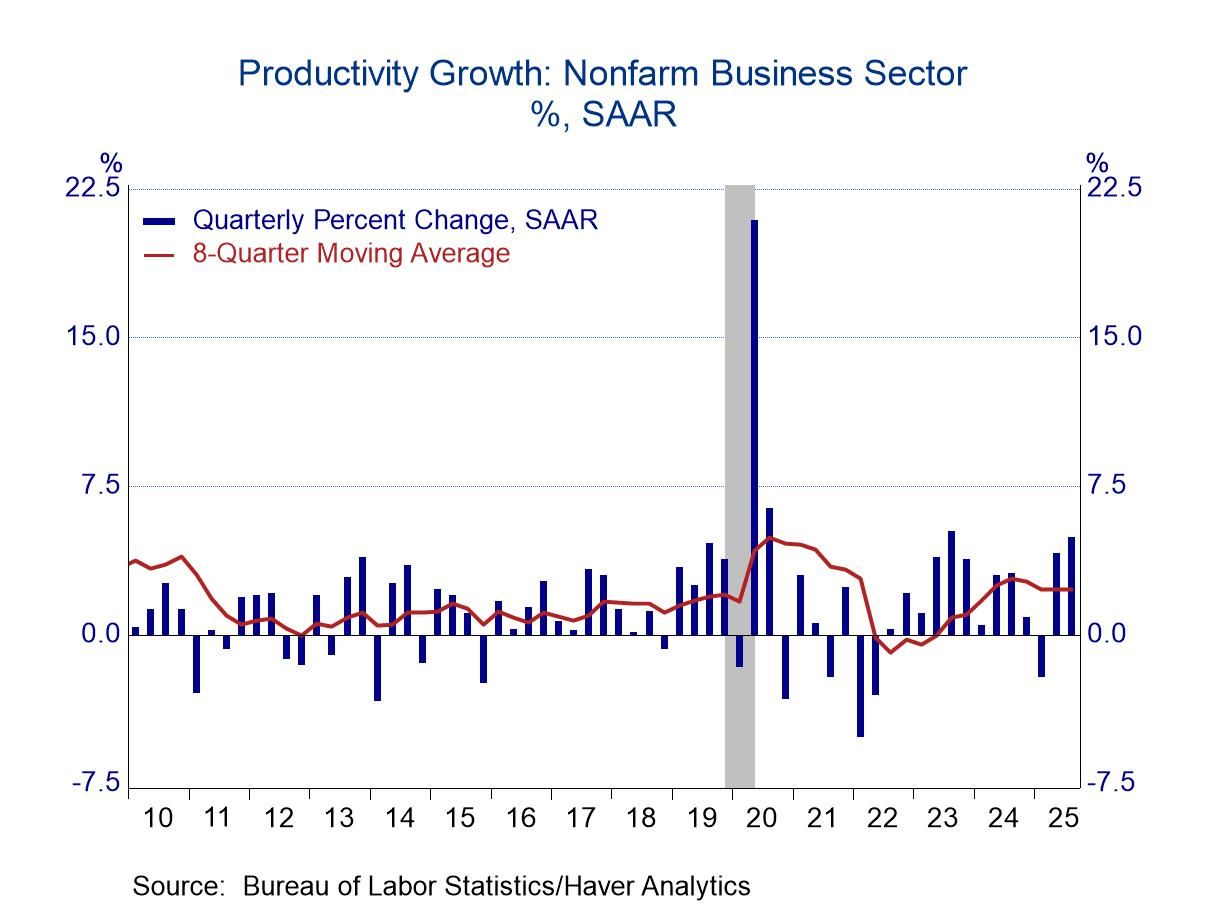 Global| Sep 14 2011
Global| Sep 14 2011U.S. Producer Prices Are Tame M/M But Core Trend Increase Is Up
by:Tom Moeller
|in:Economy in Brief
Summary
The U.S. producer price index for finished goods was unchanged last month after an unrevised 0.2% July gain. The figure compared to Consensus expectations for a 0.1% slip, according to the Action Economics survey. Like July, the [...]
 The U.S. producer price index for finished
goods was unchanged last month after an unrevised 0.2% July gain. The
figure compared to Consensus expectations for a 0.1% slip, according to
the Action Economics survey. Like July, the change in energy and food
prices offset one another. Excluding these two components, the 0.1% price
gain was the weakest since May and was half of the expected increase. However,
there's evidence of firmer pricing power. The 2.5% twelve-month increase
in core prices was double last year's rise and the 3.4% three-month gain
was triple.
The U.S. producer price index for finished
goods was unchanged last month after an unrevised 0.2% July gain. The
figure compared to Consensus expectations for a 0.1% slip, according to
the Action Economics survey. Like July, the change in energy and food
prices offset one another. Excluding these two components, the 0.1% price
gain was the weakest since May and was half of the expected increase. However,
there's evidence of firmer pricing power. The 2.5% twelve-month increase
in core prices was double last year's rise and the 3.4% three-month gain
was triple.
Finished consumer goods prices were unchanged (8.2% y/y) with the rise held back by lower energy prices. Conversely, the 1.1% rise in food prices doubled July's gain. Outside of energy & food, pricing power weakened with a 0.1% m/m rise (2.5% y/y). Within the components, women's apparel prices rose 1.8% y/y after last year's 0.5% y/y decline and men's apparel costs jumped 5.2% y/y after a 0.3% 2010 uptick. Household furniture prices rose 2.0%, up from 0.3% last year, and appliance prices rose 1.5% after a 0.6% fall in 2010. Passenger car prices reversed most of last year's 1.4% decline and tobacco prices rose a stable and strong 6.2% y/y. Capital goods prices slipped 0.2% last month but were up 1.6% y/y after last year's 0.4% gain.
The energy price decline reflected a 1.0% drop (+32.8% y/y) in gasoline and a 1.2% decline (+37.0% y/y) in home heating oil. Electric power costs slipped 0.1% (+1.1% y/y). Food prices again rose a strong 1.1% (8.4% y/y) led by a more-than one-third rise in prices for eggs and the 17.2% rise in beef. Dairy prices also posted a firm 17.8% y/y gain and vegetable prices rose 6.3%.
Intermediate goods prices fell 0.5% as energy prices declined 2.3% (+19.1% y/y) and food prices rose 1.7% (15.3% y/y). Core-intermediate prices slipped 0.1% (+7.5% y/y). Crude materials prices ticked up 0.2% as energy prices fell 5.1% (+5.3% y/y) but food prices jumped 4.7% (29.1% y/y). However, prices less food & energy rose another, strong 1.6% and by one-quarter y/y. Strength in aluminum as well as iron & steel scrap prices continued with a one-quarter y/y rise.
The PPI data are contained in Haver's USECON database with further detail in PPI and PPIR. The expectation figure is available in the AS1REPNA database.
| Producer Price Index (%) | Aug | Jul | Jun | Aug Y/Y | 2010 | 2009 | 2008 |
|---|---|---|---|---|---|---|---|
| Finished Goods | 0.0 | 0.2 | -0.4 | 6.5 | 4.2 | -2.5 | 6.4 |
| Energy | -1.0 | -0.6 | -2.8 | 16.3 | 13.7 | -17.7 | 14.1 |
| Food | 1.1 | 0.6 | 0.6 | 8.4 | 3.9 | -1.4 | 6.8 |
| Less Food & Energy | 0.1 | 0.4 | 0.3 | 2.5 | 1.2 | 2.5 | 3.4 |
| Intermediate Goods | -0.5 | 0.2 | 0.0 | 10.6 | 6.4 | -8.4 | 10.3 |
| Less Food & Energy | -0.1 | 0.2 | 0.3 | 7.5 | 4.3 | -4.2 | 7.4 |
| Crude Materials | 0.2 | -1.2 | -0.6 | 18.5 | 21.4 | -30.3 | 21.5 |
| Less Food & Energy | 1.6 | 0.7 | 1.1 | 24.2 | 32.6 | -23.4 | 14.7 |
Tom Moeller
AuthorMore in Author Profile »Prior to joining Haver Analytics in 2000, Mr. Moeller worked as the Economist at Chancellor Capital Management from 1985 to 1999. There, he developed comprehensive economic forecasts and interpreted economic data for equity and fixed income portfolio managers. Also at Chancellor, Mr. Moeller worked as an equity analyst and was responsible for researching and rating companies in the economically sensitive automobile and housing industries for investment in Chancellor’s equity portfolio. Prior to joining Chancellor, Mr. Moeller was an Economist at Citibank from 1979 to 1984. He also analyzed pricing behavior in the metals industry for the Council on Wage and Price Stability in Washington, D.C. In 1999, Mr. Moeller received the award for most accurate forecast from the Forecasters' Club of New York. From 1990 to 1992 he was President of the New York Association for Business Economists. Mr. Moeller earned an M.B.A. in Finance from Fordham University, where he graduated in 1987. He holds a Bachelor of Arts in Economics from George Washington University.








